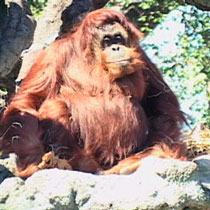2007年VOA标准英语-US Preserve Houses Hundreds of Primates(在线收听)
Washington, DC
15 June 2007
In the subtropical climate of southern Florida, a state in the southeast United States, many people each year visit a "jungle" that advertises itself as the place "where humans are caged and monkeys run wild." It's called the "Monkey Jungle," a primate park in the humid forests on the edge of one of the largest U.S. cities. Producers Ade Astuti and Ariadne Budianto take you there.
 |
Unlike many local zoos, where animals are caged, the primates here roam freely through much of Monkey Jungle. Here, it is the people who are behind wire.
One of the main caretakers, Katlyn Chantlor, leads tourists through the park.
 |
| Katlyn Chantlor |
In 1933, animal behaviorist Joseph DuMond released six Macacas in the South Florida forest. Today, the 12-hectare reserve still attracts scientists interested in primate behavior.
Monkey Jungle Manager Steve Jacques wants visitors to understand the legacy of this place. "Sheron DuMond [granddaughter of Joseph DuMond], who is obviously the granddaughter of the original people, owns and operates the park today," he explains." So it's the third generation and basically her objective is to maintain the tradition and dreams that her grandparents and parents had. That is to provide a facility, a home for the animals to promote education and conservation to the public as they come in."
The park bills itself as one of the few protected habitats in the U.S. for endangered primates that normally live in the wilds of South America, Asia and Africa.
Mei is a 21-year-old Orangutang. At home in Indonesia, some varieties are considered endangered. Here, the popular Mei is fluent in sign language. Katlyn communicates with Mei by saying, "I love you."
For a $25 entrance fee, tourists can see and interact with the monkeys. People can feed raisins to squirrel monkeys.
Pennsylvania resident Christen Griffin visited Monkey Jungle with her family to experience the wildlife habitat. "It's almost like hands on," she said. "You're not allowed to touch them, but [you may] feed them and interact. It's definitely an excellent experience."
The people who run Monkey Jungle hope visitors will not only be entertained, but also appreciate the behavior of primates and their tenuous place in the world.